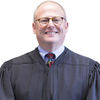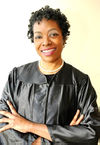Michigan Supreme Court elections, 2014
Election highlights
|
2015 →
← 2013
|
| Judicial Elections |
|---|

|
| Judicial elections, 2014 |
| Judicial election dates |
| Candidates by state |
| Supreme court elections |
Results
Blue represents the Democratic Party, red represents the Republican Party and gray represents another, minor party.
| 8-year term (2 seats) | ||||
|---|---|---|---|---|
| Candidate | Vote % | |||
| Brian Zahra | 32% | |||
| James Robert Redford | 20.6% | |||
| Richard Bernstein | 28.7% | |||
| William B. Murphy | 14.1% | |||
| Doug Dern | 4.5% | |||
| 100% of counties reporting[1] | ||||
| Incumbents | Michael Cavanagh | |||
| Brian Zahra | ||||
| Winners | Richard Bernstein | |||
| Brian Zahra | ||||
| 2-year term | ||||
|---|---|---|---|---|
| Candidate | Vote % | |||
| David Viviano | 61.7% | |||
| Deborah Thomas | 28.7% | |||
| Kerry L. Morgan | 9.6% | |||
| 100% of counties reporting[2] | ||||
| Incumbent | David Viviano | |||
| Winner | David Viviano | |||
Partisan stakes
Though Michigan's elections are technically nonpartisan, candidates are nominated by party committees. At the time of election, the Michigan Supreme Court had five Republicans and two Democrats on its bench. One Democratic seat and two Republican seats were up for election in 2014.
In Michigan, the GOP held the governorship, a majority in both legislative houses and a majority on the supreme court. This is referred to as a trifecta plus by Ballotpedia. More information on state government trifectas is available here: Ballotpedia: State government trifectas.
Seats not up for election
Justices:
On the ballot: 8-year term (2 open seats)
| 2014 candidates for the Michigan Supreme Court | |
| 8-year term | |
| William B. Murphy | Incumbent: No Party: Democratic Primary vote: n/a Election vote: 14.2% |
| Richard Bernstein | Incumbent: No Party: Democratic Primary vote: n/a Election vote: 28.9% |
| James Robert Redford | Incumbent: No Party: Republican Primary vote: n/a Election vote: 20.1% |
| Doug Dern | Incumbent: No Party: Natural Law Party Primary vote: n/a Election vote: 4% |
| Brian Zahra | Incumbent: Yes Party: Republican Primary vote: n/a Election vote: 32.2% |
In early 2014, Justice Michael Cavanagh announced his retirement, opening up a seat on the high court. Incumbent Brian Zahra ran for re-election to his own seat. There were four other competitors in the running for the seats of Cavanagh and Zahra.[3]
On the ballot: 2-year term
| 2014 candidates for the Michigan Supreme Court | |
| 2-year term | |
| Kerry L. Morgan | Incumbent: No Party: Libertarian Primary vote: n/a Election vote: 9% |
| Deborah Thomas | Incumbent: No Party: Democratic Primary vote: n/a Election vote: 28.9% |
| David Viviano | Incumbent: Yes Party: Republican Primary vote: n/a Election vote: 62.1% |
Justice David Viviano, appointed in 2013 to replace Diane Hathaway--after she resigned when the Michigan Judicial Tenure Commission called for her suspension--was re-elected to the court. This allowed him to complete Hathaway's unfinished term.[3]
Political composition
From 2000 on, the court had been under Republican control. During party conventions occurring August 22 and 23, 2014, the parties selected their candidates. The Democrats nominated Michigan Court of Appeals Judge William B. Murphy, Richard Bernstein, and Deborah Thomas. The Republicans selected three candidates: incumbent Brian Zahra, Judge James Robert Redford, and David Viviano.
Grassroots parties were also represented in the election. Lawyer Kerry L. Morgan was selected by the Libertarians. The Natural Law party chose Doug Dern at its convention.[4][5]
After the nominating conventions, political party affiliations no longer had any bearing on the supreme court election, since the ballot was nonpartisan.
Campaign finance
Contributions
Total campaign contributions received and reported:
8-year term:
| Candidate | Total contributions |
|---|---|
| Doug Dern | $0.00 |
| Brian Zahra | $944,626.47[6][7][8][9] |
| Richard Bernstein | $2,176,721.00[10][11][12][13] |
| William "Bill" Murphy | $280,451.00[14][15][16] |
| James Robert Redford | $424,119.25[17][18][19][20] |
2-year term:
| Candidate | Total contributions |
|---|---|
| Kerry L. Morgan | $0.00 |
| David Viviano | $893,856.47[21][22][23][24] |
| Deborah Thomas | $78,530.00[25][26][27][28] |
Major donors
Brian Zahra & David Viviano campaigns
Zahra and Viviano shared 11 fundraising events through early August 2014. Because of this, their top donor lists, as of August 15, 2014, looks similar.
- DeVos family: $61,200
- Partners and associates of the Conway MacKenzie Law Firm (and a partner's family members): $58,850
- Michigan Chamber of Commerce PAC and an employee: $20,475
- Moroun family members: $20,400
- Partners and associates of the Kienbaum Opperwall Law Firm: $15,000
- Partners and associates of the Dickinson Wright Law Firm to Zahra: $22,286
- Partners and associates of the Dickinson Wright Law Firm to Viviano: $19,820.[29]
Robert Bernstein campaign
- DeVos family: $61,200
- PAC and partners of Warner Norcross and Judd: $9,100[29]
Judicial recusal and impartiality
According to the Michigan Campaign Finance Network, more than $61 million was spent on Michigan Supreme Court election campaigns between 2000 and 2014.[30] Much of this spending came from individuals or groups with interests in cases before the court, including attorneys and parties. While many states have guidelines regarding when a justice should recuse themselves in cases involving campaign contributors, Michigan does not have formal recusal rules related to campaign donations. According to the Michigan Campaign Finance Network, Michigan was the only state without such rules as of 2012.[30]
Since 2000, only 43 percent of all spending on supreme court races in Michigan was reported in official campaign reports. Candidates have spent a reported $26.6 million on television ads, with an estimated $34.7 million in additional unreported television advertising. These unreported expenditures are typically categorized as “issue” ads and are not subject to the same disclosure requirements. The Michigan Campaign Finance Network compiles spending estimates by requesting ad purchase data directly from TV stations during campaign seasons.[31]
Following the 2012 election, the Judicial Selection Task Force convened to evaluate campaign finance practices in judicial elections. It recommended full disclosure of campaign contributions.[31]
Additionally, Michigan maintains a list of lobbyable elected officials; judges are not included on that list.[30]
Public funding
The American Bar Association recommends that states with competitive elections, like Michigan, provide public funding to cover the cost. This would allow the candidates to campaign for office while not having to take funds from interest groups or lawyers, both of whom may appear before the court at some point.[32]
Noteworthy events
NFIB endorses Michigan Supreme Court candidates
On September 8, 2014, the National Federation of Independent Business (NFIB) announced its endorsements for the Michigan Supreme Court. The group endorsed Brian Zahra, David Viviano, and James Robert Redford for the upcoming election.
Charles Owens, Michigan director of NFIB, said Justices Zahra and Viviano had shown leadership on the state supreme court and "avoided the temptation to create law."[33] He also said their judicial records reflected an understanding of "the vital role a fair and balanced court plays in addressing the problems facing family businesses and their employees."[33]
NFIB endorsed Circuit Judge Redford as well, with Owens citing his “solid record of consistent application of the law that respects the role of the court as judicial – not legislative."[33]
Owens encouraged voters to support judicial candidates who promote what he described as a "fair, stable legal system." He contrasted this with what he characterized as efforts by some trial lawyers to increase their earnings through litigation.[33]
According to the NFIB’s press release, the organization’s endorsement includes voter outreach efforts among its membership.[33]
See also
External links
Footnotes
- ↑ Michigan Department of State, "2014 General Election Results - Justice of Supreme Court 8 Year Terms (2) Positions," November 4, 2014
- ↑ Michigan Department of State, "2014 General Election Results - Justice of Supreme Court Partial Term Ending 01/01/2017," November 4, 2014
- ↑ 3.0 3.1 Crains Detroit Business, "Election countdown: From governor to high court, 5 things for Michigan voters to watch," September 1, 2014
- ↑ Libertarian Party, "Liberty Candidates '14: Kerry Morgan," accessed September 4, 2014
- ↑ Detroit News, "Political Insider: GOP points finger at Schauer spending," August 28, 2014
- ↑ Michigan Secretary of State, "Brian Zahra Pre-Convention Report Summary Page," September 5, 2014
- ↑ Michigan Secretary of State, "Brian Zahra Post-Convention Report Summary Page," September 22, 2014
- ↑ Michigan Secretary of State, "Brian Zahra Pre-General Report Summary Page," October 31, 2014
- ↑ Michigan Secretary of State, "Brian Zahra Post-General Report Summary Page," December 3, 2014
- ↑ Michigan Secretary of State, "Richard Bernstein Post-General Report Summary Page," December 4, 2014
- ↑ Michigan Secretary of State, "Richard Bernstein Pre-General Report Summary Page," November 4, 2014
- ↑ Michigan Secretary of State, "Richard Bernstein Post-Convention Report Summary Page," September 21, 2014
- ↑ Michigan Secretary of State, "Richard Bernstein Pre-Convention Report Summary Page," August 20, 2014
- ↑ Michigan Secretary of State, "Bill Murphy Post-General Report Summary Page," November 26, 2014
- ↑ Michigan Secretary of State, "Bill Murphy Pre-General Report Summary Page," October 24, 2014
- ↑ Michigan Secretary of State, "Bill Murphy Post-Convention Report Summary Page," September 22, 2014
- ↑ Michigan Secretary of State, "James Robert Redford Post-General Report Summary Page," December 3, 2014
- ↑ Michigan Secretary of State, "James Robert Redford Pre-General Report Summary Page," October 31, 2014
- ↑ Michigan Secretary of State, "James Robert Redford Post-Convention Report Summary Page," October 31, 2014
- ↑ Michigan Secretary of State, "James Robert Redford Pre-Convention Report Summary Page," August 12, 2014
- ↑ Michigan Secretary of State, "David Viviano Post-General Report Summary Page," December 3, 2014
- ↑ Michigan Secretary of State, "David Viviano Pre-General Report Summary Page," October 31, 2014
- ↑ Michigan Secretary of State, "David Viviano Post-Convention Report Summary Page," October 31, 2014
- ↑ Michigan Secretary of State, "David Viviano Pre-Convention Report Summary Page," August 12, 2014
- ↑ Michigan Secretary of State, "Deborah Thomas Post-General Report Summary Page," December 4, 2014
- ↑ Michigan Secretary of State, "Deborah Thomas Pre-General Report Summary Page," October 24, 2014
- ↑ Michigan Secretary of State, "Deborah Thomas Post-Convention Report Summary Page," September 22, 2014
- ↑ Michigan Secretary of State, "Deborah Thomas Pre-Convention Report Summary Page," August 13, 2014
- ↑ 29.0 29.1 Michigan Campaign Finance Network, "Donors behind the statewide candidates," August 15, 2014
- ↑ 30.0 30.1 30.2 Michigan Campaign Finance Network, "A Citizen’s Guide to Michigan Campaign Finance 2012," accessed September 9, 2014
- ↑ 31.0 31.1 Cite error: Invalid
<ref>tag; no text was provided for refs namedMR - ↑ Michigan Campaign Finance Network, "Ecology of Michigan Supreme Court Election Campaigns," accessed September 9, 2014
- ↑ 33.0 33.1 33.2 33.3 33.4 NFIB.com, "NFIB announces endorsements for Michigan Supreme Court," September 8, 2014
| |||||













